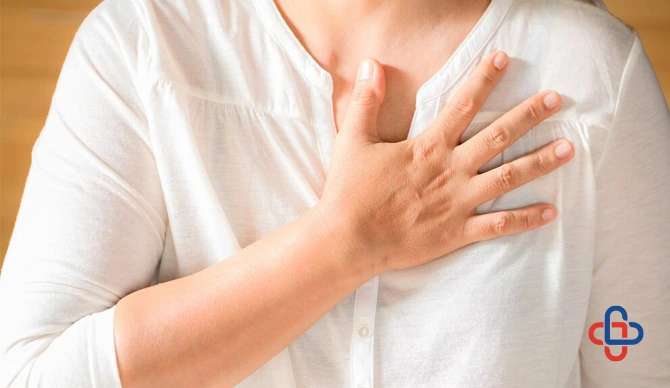Does your heart ever start to skip beats after having a meal? If so, you should know that this unsettling sensation might not just be your imagination – Heart palpitations, though often harmless, can be concerning.
Understanding the triggers, such as certain foods, can help you manage these irregular heartbeats.
Let’s explore what causes heart palpitations after eating and understand which foods to avoid if you have heart palpitations.
Table of contents
What is a Heart Palpitation?
A heart palpitation is the sensation that your heart is fluttering, pounding, or skipping a beat. It can feel like a rapid or irregular heartbeat. While occasional palpitations are usually harmless, they can sometimes point toward an underlying heart condition or other health issues.
Causes of Heart Palpitations After Eating
Several factors can trigger heart palpitations after a meal, including:
- Eating large meals: Digesting a heavy meal can put a strain on your heart.
- Food sensitivities or allergies: Certain foods may trigger an allergic reaction or sensitivity, leading to palpitations.
- Stimulants: Foods and drinks containing caffeine or other stimulants can increase heart rate.
- Spicy foods: Spices can cause a temporary increase in heart rate.
- High-fat foods: Foods high in fat can cause bloating and indigestion, potentially leading to palpitations.
Heart Palpitation Symptoms
Symptoms of heart palpitations may include:
- Fluttering or pounding sensation in the chest
- Rapid or irregular heartbeat
- Dizziness or lightheadedness
- Shortness of breath
- Chest pain or discomfort
Foods to Avoid If You Have Heart Palpitations
Here’s a list of foods that cause heart palpitations, and should be avoided if you’re suffering from this heart-related condition:
- Caffeinated Foods and Drinks: Coffee, tea, energy drinks, and chocolate contain caffeine, which can stimulate your heart and trigger palpitations.
- Excessively Spicy Foods: Spicy dishes containing chili peppers or hot sauces can cause a temporary increase in heart rate.
- Red Meat: High-fat meats like beef and lamb can be harder to digest, potentially leading to palpitations.
- Processed Snack Foods: Chips, crackers, and other processed snacks often contain unhealthy fats and additives that can disrupt heart rhythm.
- Alcohol: Excessive alcohol consumption can lead to dehydration and irregular heartbeats.
- Sodas: Sugary sodas and carbonated drinks can cause spikes in blood sugar and may contain caffeine or other stimulants.
- Packaged Baked Goods: Commercially baked goods like cakes and pastries often contain high levels of sugar and unhealthy fats.
- Processed Deli Meats: Deli meats are high in sodium and preservatives, which can contribute to heart palpitations.
How Do I Manage Heart Palpitations After Eating?
To manage heart racing after eating, try the following:
- Eat smaller, more frequent meals to avoid overloading your digestive system.
- Stay hydrated by drinking plenty of water throughout the day.
- Limit caffeine and stimulants.
- Avoid trigger foods that you know can cause palpitations.
- Practice stress-reducing techniques like deep breathing or meditation.
When to See a Doctor?
While occasional heart palpitations are usually harmless, you should see a doctor if you experience frequent palpitations, especially if they are accompanied by other symptoms such as chest pain, shortness of breath, or dizziness.
Your doctor can help determine the underlying cause and recommend appropriate treatment.
Conclusion
By being mindful of your diet and avoiding trigger foods, you can help manage heart palpitations and keep your heart healthy and happy.
Remember, what you eat can have a significant impact on your heart rhythm, so choose wisely and listen to your body’s signals.
For any heart-related concerns and inquiries, visit Manhattan Cardiology Care for a consultation with our expert cardiologists.
Disclaimer
This blog is for informational & educational purposes only and does not intend to substitute any professional medical advice or consultation. For any health-related concerns, please consult with your physician, or call 911.
